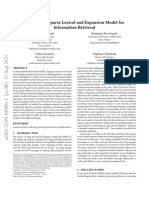0 ratings0% found this document useful (0 votes)
15 viewsPython
Uploaded by
Appidi Sai Sushrith ReddyCopyright
© © All Rights Reserved
We take content rights seriously. If you suspect this is your content, claim it here.
Available Formats
Download as RTF, PDF, TXT or read online on Scribd
0 ratings0% found this document useful (0 votes)
15 viewsPython
Uploaded by
Appidi Sai Sushrith ReddyCopyright
© © All Rights Reserved
We take content rights seriously. If you suspect this is your content, claim it here.
Available Formats
Download as RTF, PDF, TXT or read online on Scribd
You are on page 1/ 3
To master Python in three months, you’ll need a structured and
intensive learning plan. This schedule will cover core Python
programming concepts, advanced topics, libraries, and practical
projects. This plan assumes a commitment of around 3-4 hours of
study per day.
### Month 1: Core Python Programming
#### Week 1: Introduction and Basic Syntax
- **Day 1-2**: Introduction to Python (History, Installation, IDEs)
- **Day 3-4**: Basic Syntax (Variables, Data Types, Operators)
- **Day 5-6**: Control Structures (if-else, loops)
- **Day 7**: Functions and Modules
#### Week 2: Data Structures
- **Day 8-9**: Lists and Tuples
- **Day 10-11**: Dictionaries and Sets
- **Day 12-13**: String Manipulation
- **Day 14**: List Comprehensions and Generators
#### Week 3: Advanced Functions and Error Handling
- **Day 15-16**: Lambda Functions and Higher-Order Functions
- **Day 17-18**: Map, Filter, and Reduce
- **Day 19-20**: Exception Handling (try-except)
- **Day 21**: Custom Exceptions
#### Week 4: File I/O and Modules
- **Day 22-23**: Reading and Writing Files
- **Day 24-25**: Working with CSV and JSON files
- **Day 26-27**: Python Standard Library Overview
- **Day 28**: Creating and Using Custom Modules
### Month 2: Advanced Python Concepts
#### Week 5: Object-Oriented Programming (OOP)
- **Day 29-30**: Classes and Objects
- **Day 31-32**: Inheritance and Polymorphism
- **Day 33-34**: Encapsulation and Abstraction
- **Day 35**: Magic Methods and Operator Overloading
#### Week 6: Functional Programming
- **Day 36-37**: Introduction to Functional Programming
- **Day 38-39**: Closures and Decorators
- **Day 40-41**: Iterators and Generators
- **Day 42**: Context Managers
#### Week 7: Web Scraping and Automation
- **Day 43-44**: Introduction to Web Scraping (Beautiful Soup)
- **Day 45-46**: Advanced Web Scraping (Scrapy)
- **Day 47-48**: Automation with Selenium
- **Day 49**: Building a Web Scraping Project
#### Week 8: Working with Databases
- **Day 50-51**: Introduction to SQL and SQLite
- **Day 52-53**: Using SQLAlchemy
- **Day 54-55**: Working with MongoDB
- **Day 56**: Database Connectivity Project
### Month 3: Libraries and Frameworks
#### Week 9: Data Analysis and Visualization
- **Day 57-58**: Introduction to NumPy
- **Day 59-60**: Pandas for Data Analysis
- **Day 61-62**: Data Visualization with Matplotlib
- **Day 63**: Advanced Data Visualization with Seaborn
#### Week 10: Machine Learning
- **Day 64-65**: Introduction to Machine Learning Concepts
- **Day 66-67**: Using Scikit-Learn for Basic ML Models
- **Day 68-69**: Deep Learning with TensorFlow/Keras
- **Day 70**: Building a Simple ML Project
#### Week 11: Web Development
- **Day 71-72**: Introduction to Flask
- **Day 73-74**: Building Web Applications with Flask
- **Day 75-76**: Introduction to Django
- **Day 77**: Building Web Applications with Django
#### Week 12: Advanced Topics and Projects
- **Day 78-79**: Working with APIs (RESTful APIs)
- **Day 80-81**: Testing and Debugging (unittest, pytest)
- **Day 82-83**: Introduction to Asynchronous Programming
(asyncio)
- **Day 84-86**: Capstone Project Planning and Setup
- **Day 87-89**: Capstone Project Development
- **Day 90**: Capstone Project Presentation and Review
### Final Review and Projects
- **Day 91-93**: Review and Revision of All Topics
- **Day 94-96**: Practice Projects (Combine various concepts
learned)
- **Day 97-99**: Advanced Project (e.g., Full Stack Application)
- **Day 100**: Final Assessment and Next Steps
### Study Tips
- **Practice Regularly**: Consistency is key to mastering Python.
- **Use Online Resources**: Utilize platforms like Codecademy,
Coursera, and Stack Overflow.
- **Join Communities**: Participate in forums, join study groups, and
attend webinars.
- **Build Projects**: Apply what you learn by building small projects
and gradually increase their complexity.
This schedule is intensive but provides a comprehensive roadmap to
mastering Python in three months. Adjust the timeline based on your
personal progress and understanding.
You might also like
- Higher Nationals in Computing: Unit 06: Managing A Successful Computing Project Assignment 10% (1)Higher Nationals in Computing: Unit 06: Managing A Successful Computing Project Assignment 134 pages
- 100 Days Comprehensive Guide On Learning Programming languages likeNo ratings yet100 Days Comprehensive Guide On Learning Programming languages like30 pages
- Here’s a complete roadmap for learning Python, from absolute beginner to advanced topics, with resources for each step.No ratings yetHere’s a complete roadmap for learning Python, from absolute beginner to advanced topics, with resources for each step.3 pages
- A Comprehensive Guide to Learning Python for Year 10 StudentsNo ratings yetA Comprehensive Guide to Learning Python for Year 10 Students4 pages
- Raod Map Schedule of Python for ML and AINo ratings yetRaod Map Schedule of Python for ML and AI13 pages
- Sci 3265 Computer Science II Outline 2024 SeriesNo ratings yetSci 3265 Computer Science II Outline 2024 Series3 pages
- Unit 2: Chapter 3: Requirements Analysis and Specification 1. Requirements Gathering and AnalysisNo ratings yetUnit 2: Chapter 3: Requirements Analysis and Specification 1. Requirements Gathering and Analysis21 pages
- KMS Management Datalog Manual V1.4.0.2 1No ratings yetKMS Management Datalog Manual V1.4.0.2 116 pages
- Java For Android: Indefinite Loops: Julie L. JohnsonNo ratings yetJava For Android: Indefinite Loops: Julie L. Johnson15 pages
- Advanced LIMS Technology - Case Studies and Business OpportunitiesNo ratings yetAdvanced LIMS Technology - Case Studies and Business Opportunities268 pages
- Prolog Programs Are A Collection of FactsNo ratings yetProlog Programs Are A Collection of Facts23 pages
- Everest Group Intelligent Document Processing and Unstructured Document Processing Products PEAK Matrix Assessment 2023No ratings yetEverest Group Intelligent Document Processing and Unstructured Document Processing Products PEAK Matrix Assessment 202315 pages
- Leica DISTO D2: The Original Laser Distance MeterNo ratings yetLeica DISTO D2: The Original Laser Distance Meter42 pages
- Windows 10 ROG Edition v6 + Office 2019 Updated Nov 2019 DownloadNo ratings yetWindows 10 ROG Edition v6 + Office 2019 Updated Nov 2019 Download15 pages
- Crop Yield Prediction Using Machine LearningNo ratings yetCrop Yield Prediction Using Machine Learning4 pages
- SPLADE v2: Sparse Lexical and Expansion Model For Information RetrievalNo ratings yetSPLADE v2: Sparse Lexical and Expansion Model For Information Retrieval6 pages
- 45366-web-application-firewall-(waf)-evasion-techniques-2No ratings yet45366-web-application-firewall-(waf)-evasion-techniques-210 pages

























































































